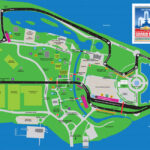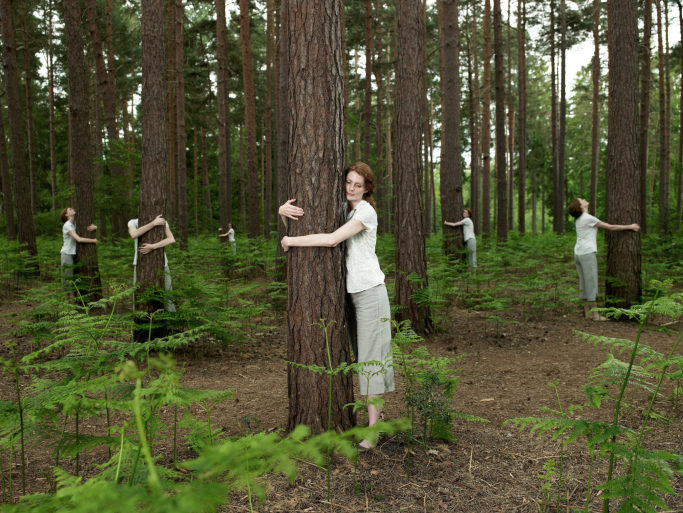Detroit GP in doubt after 2018 (6th Update)
 |
| The tree huggers want the race to go away so they have three additional days to hug trees in the park |
UPDATE Organizers of IndyCar's Chevrolet Detroit Grand Prix will "assert their case for continued racing" today during the "monthly meeting of the Belle Isle Advisory Committee." The organizers "intend to make public highlights of the proposal they will submit to the state Department of Natural Resources." They will seek "permission to race for 'several years,' a shorter duration than the original 10-year agreement" with the city. Race Chair Bud Denker said that it is "up to the state to determine the necessity for an independent environmental review." DETROIT NEWS.
Denker said that if the race "doesn't get a new contract to race at Bell Isle, the event likely won't be held in Michigan." DETROIT FREE PRESS
Here are the other details proposed to the committee and the DNR:
- A three-year term with an option for a two-year extension.
- An increase in the fee the Grand Prix pays to the Michigan Department of Natural Resources to $300,000 a year, up from $200,000.
- The proposal also aims to "load in" the event on the island in 39 days, down by seven days from this year, reducing the disruption to residents. The event will last for three days. "Load out" will be completed within 20 days. This year it took 65 days to load in and load out the event.
- The Grand Prix is offering to make an annual contribution of $50,000 for a project determined by the DNR.
- It is offering another annual contribution of $35,000 to a fund for projects in the race paddock area, which is used for events such as fireworks, weddings and, on Friday, Detroit police driving training.
05/26/18 A small group of conservationists gathered outside Belle Isle Park Saturday to protest the annual Chevrolet Detroit Grand Prix being held at the park.
Protesters along Jefferson Avenue held signs reading "Take back Belle Isle" and "We don't hate the race, just find another place – ya gotta Belle-Leave."
Belle Isle Concern, an organization focused on getting the race removed from the island, organized the protest Saturday. The group believes Detroit's island park should be a public space for residents, not a private Indy racetrack.
The protests come as the future of the Detroit Grand Prix remains up in the air as an existing five-year agreement to host it on Belle Isle is set to run out this year and organizers discuss whether to drive ahead. Detroit News
 |
| Opponents do not want a noisy race in their park. Such nonsense. For one weekend they can't go there to hug a tree. |
05/23/18 The future of the Detroit Grand Prix remains up in the air as an existing agreement to host it on Belle Isle is set to run out this year and organizers discuss whether to drive ahead.
State Department of Natural Resources officials told Detroit City Council on Tuesday during an annual briefing on the island's progress that an existing five-year agreement to host the race was honored by the state when the DNR assumed management of the island as a state park Feb. 10, 2014, under a 30-year lease agreement with the city.
"So far, we have not received a request for going forward in the future," said Ron Olson, parks chief for the state DNR. "Right now, we're just taking care of this year, and we'll have to see when and if we get a proposal and then evaluate it."
The Grand Prix festivities have been a source of contention for some resident groups who have complained about the timetable required to set up and tear down the event as well as the restrictions it places on access to certain portions of the 982-acre island between April and June.
The three-day racing event boasts $45 million to $50 million annually in economic development, according to organizers. It draws between 90,000 and 100,000 fans, primarily from Wayne, Oakland, Macomb and Washtenaw counties.
Grand Prix Chairman Bud Denker told The Detroit News on Tuesday there aren't any other locations within the city that would be viable for hosting the event, including suggested sites such as Detroit's City Airport and the former State Fairgrounds. Organizers, he said, aren't looking to move the event outside of the city, either.
"There's no option B. It's Belle Isle," said Denker, noting if they decide against holding the race on the island "it would disappear."
Denker on Tuesday said changes have been made to minimize the footprint of the Grand Prix as well as the length of time that it restricts access to some portions of the island. Setup and tear-down were reduced by one week this year, kicking off in April and anticipated to be completed by June 23.
Organizers, he said, also took steps to keep the west end perimeter by the water open three weeks longer for public access.
"We hear them and we're compromising," Denker said. "But, we also have 90,000 people who will be down there that are proponents of the event as well, too. We're trying to find that balance and we've made these changes as a result of that."
Sandra Novacek, a coordinator of Belle Isle Concern, a group of park users advocating for the protection of the park, said the changes don't address the underlying issue of maintaining the integrity of the park. Residents aren't against the race, she said, but they don't think it belongs on the island.
“It’s kind of like somebody beating you 100 days out of the year and then reducing it down to 80. It still hurts," Novacek said. “The race violates the mission of the park. You don’t see a race like that in Central Park or any other state park in Michigan."
The group, she added, is planning a rally from noon to 2 p.m. Saturday at the entrance of Belle Isle to protest the race being held there and advocate for the park's preservation. This year's race is being held June 1-3.
Denker said officials expect to make a determination by June or July. When asked if fans should be worried about the fate of the racing event, Denker said: "We don't know yet. We're debating it."
The Grand Prix has taken place on Belle Isle periodically since 1992 and every year since 2012. The Grand Prix currently pays a $200,000 fee each year to put on the event.
Separately, Olson on Tuesday touted climbing attendance rates on Belle Isle. For 2017, the island had 4.2 million visitors making it the largest attended state park in the United States.
"This gets more visitors by far than Mackinac Island," he told council members.
The latest attendance figures are up from a reported 4.1 million visitors in the 2016 fiscal year and 3.6 million in 2015, DNR data shows.
Data provided Tuesday shows total investment on Belle Isle since 2014 is about $48 million. Detroit News
04/25/18 The Detroit Grand Prix's future hinges on its relationship with Belle Isle.
As organizers prepare to renegotiate their contract with the State of Michigan — the current deal expires after June's Chevrolet Detroit Grand Prix presented by Lear — race chairman Bud Denker remains undeterred by protesters who want the annual IndyCar Series event moved from the island park.
"We looked at options, whether it be the airport or other places, and they're not practical," Denker said at Tuesday's promotional event at the Lear Innovation Center in Detroit. "Belle Isle is the best place to have our event. There is no Plan B.
"There are some people you're not going to make happy until there's no event on Belle Isle. Even then, they're not going to be happy about something. The dissenters, you're always going to have those. They don't worry me a bit."
Protesters have voiced displeasure over the event's long set-up and tear-down surrounding the Grand Prix (June 1-3), a process expected to last 68 days. Denker, however, points to continued improvements in the process, which took 95 days in 2015.
Some also question the race's environmental impact on Belle Isle, both for visitors and wildlife. A planned garden by landscape designer Piet Oudolf would be located where the grandstands are put up during the Grand Prix.
"We have a public park that's been taken over by private enterprise, commercial enterprise," said Skip Davis, a 75-year-old Southfield resident who's worked in Detroit for decades. "Finding sanctuary in a nature park has been denied to us for almost three prime months of the year — April, May and June — for the set-up, running and dismantling of the race."
Davis and Detroit resident Alyson Turner protested Tuesday outside the Lear Innovation Center, holding a sign that read: "Belle Isle is a park, not a racetrack!"
Despite the positive economic impact of the Grand Prix — Denker said the race generated an estimated $58 million for Detroit in 2017 — Davis is skeptical.
"These numbers are so inflated," he said. "This consulting firm is hired by the Penske organization to essentially come up with a number that would amaze and astound everyone. It's far from the truth. Belle Isle is an attraction in itself — we don't need a race track to get people to Belle Isle. It's a treasure of a park." Denker said Grand Prix officials have continued to evaluate both positive and negative feedback since the race moved back to Belle Isle in 2012.
"We want to be good citizens here, but the fact is, it takes a lot to put on this race," Denker said. "We construct almost a city on Belle Isle in a period of four or five short weeks. That's about listening and being caring citizens. It puts a great burden on us because the No. 1 thing we want is safety for the drivers.
"The 100,000-plus people that come every year love our event. There are 74 corporations that give to our event, in terms of partnership, that love our event. They don't get the (negative) noise because they're positive. It's those few that complain, those few that harbor disdain for the event, that get the noise."
Denker believes the race is beneficial for Belle Isle, Detroit and the Grand Prix. Since 2007, event organizers and contributing partners have made more than $13 million in improvements to the island, including repairs to lighting and drainage systems and renovations to the Scott Fountain, the Belle Isle Casino and Belle Isle Boat Club, among other things.
"We've been good partners with the (Department of Natural Resources) and also the Belle Isle Conservancy," Denker said. "That will not stop. We're going to be key contributors. We provide a good deal of money to the DNR for being on Belle Isle; that will certainly continue into the future."
Wanting to see how this year's shortened set-up and tear-down goes, Denker said a new contract proposal to the state will likely come after the races.
"We haven't submitted any proposal yet; we haven't decided what that's going to be," he said. "I expect we'll get together after the Grand Prix, sometime in June or July. We hope to be on Belle Isle for many years to come and provide world-class racing to the city."
IndyCar driver Tony Kanaan, who attended Tuesday's event at the Lear Innovation Center, hopes to keep the race on Belle Isle.
"It's great to be here. I love this place," Kanaan said. "I love the volunteers. I've never been to a place where they're so nice. You go to some venues and they're mean to us. It's the most pleasant (in Detroit), they're smiling all the time, they're happy. It's a great place to be." Chris Nelsen, Special to the Detroit Free Press
09/21/17 The department held a public meeting Wednesday at the Belle Isle Nature Center to gather feedback. Dozens of residents attended.
Opponents voiced concerns about the race's environmental impact. Several conservation groups have requested a third-party environmental impact study on how the race affects island habitat.
"We've already determined that people who use the park do not want this race in the park. Something is wrong here," said Michael Betzold, a member of grass-roots group Belle Isle Concern. "The Grand Prix is a great event, but it does not belong on Belle Isle, not any more than an indoor soccer match belongs in the DIA's (Detroit Institute of Arts') Rivera Court. Take this race somewhere else."
But supporters said the race shines a spotlight on Detroit and stimulates the economy. Organizers have said the three-day event accounts for $45 million to $50 million in economic development each year.
"No other race in the country has that kind of national and international coverage," said Ed Weglarz, a volunteer manager with the Grand Prix. "By moving it somewhere else, you are going to lose that big advantage. This is a bad time to get off the bandwagon."
The natural resources department and Grand Prix officials said they will review the feedback and will hold another public input forum if they decide to draft a proposed agreement. ESPN/AP
 |
| If the race didn't lose so much money, it would be easier to justify keeping it |
09/21/17 The Detroit Grand Prix got mixed reviews Wednesday night during a meeting about the future of the annual racing event on Belle Isle.
The state's Department of Natural Resources organized the meeting at the park's nature center to get public feedback as officials consider renewing the race's contract.
Grand Prix boosters said the race puts Detroit in a positive spotlight and stimulates the local economy.
Detractors said the event intrudes on the quiet peacefulness of the park for several weeks during the start of the summer season. They also aired concerns about its environmental impact.
Detroit resident Sharron Solomon, 61, said she can hear the cars from her house a mile and a half away.
"I don't care where else you put the Grand Prix. There's many other options in the city of Detroit," she said. "But Belle Isle is a place for peace and serenity."
DNR officials are considering whether to renew an agreement that would allow the race to continue on the island. The current five-year contract expires after the 2018 race.
Both the DNR and officials from the Grand Prix said they will review the feedback. If a proposed agreement is drafted, it will be made available for public review, and there will be another public forum to get input. Detroit Free Press
 |
| The Detroit GP loses over $1 million each year and some people think that is OK |
09/20/17 The Michigan Department of Natural Resources tonight is holding a meeting to "get the public's input" on the Verizon IndyCar Series Chevrolet Detroit Grand Prix as officials consider "whether to renew a five-year agreement that would allow the race to continue" on Belle Isle.
The current Grand Prix agreement with the city of Detroit was "honored by the DNR when the department assumed management of the island" in February '14. The agreement "will expire this year." DETROIT FREE PRESS,
09/12/17 It has about $1 million more in liabilities than assets at end of every year, but organizers say that is OK.
The future is up in the air for Belle Isle’s Grand Prix, which needs approval from the Department of Natural Resources to continue beyond 2018 and routinely fails to turn a profit.
But the Chevrolet Grand Prix of Detroit presented by Lear, as it is known with the full bells and whistles of corporate sponsorship, is a success, the organizers say, because it draws money to the economy of the city, helps finance the improvement of Belle Isle, provides a postcard to the world for a rising Detroit, and it is quality racing.
“There is a lot of different ways to look at measuring the success for the Grand Prix, and certainly I wouldn’t say the financial outcome of our event is one of those," said Bud Denker, race chairman.
“We would love to make a profit on an event like this, but that’s not our goal, frankly. And that’s not where we are."
It is also a success, observers say, because of how motor sports, in this case the IndyCar Series, is financed.
Motor sports are not always about the direct profit. It is about sponsorship and marketing, customer relations and hospitality, product development and high-performance engineering.
Kanaan runs with big boys but knows IndyCar is anyone's race
Racing is also about the sort of passion that makes someone pour money into the pursuit of speed, even if it costs a lot.
ABC and NBC pay IndyCar to broadcast the series. IndyCar receives a sanction fee from the organizers in Detroit, but derives no other revenue.
As long as the organizers are willing to raise financing from sponsorship and ticket sales, cover any remaining costs to finance the staging and have permission, they will race.
The so-called bottom line is not really a bottom line.
“When you look at profit, loss and economic impact studies, they go pretty deep," said Mark Dodds, a professor of sports law and marketing at the State University of New York at Cortland. “But there is also a large intrinsic value of Detroit hosting an international event such as this, when you think of the motor sport connection to Detroit.
“And only a million down financially? Even if it was much, much worse, you could see it being carried, because of its worth," Dodds said.
“With 77 different (sponsorship) partners for the Detroit event, you’re looking at a huge growth on the business side, with sponsors wanting to get involved with it."
Giving back to Belle Isle
Big sports events do not always make money. But it also is possible for organizers and their partners to recoup losses not covered by ticket sales or sponsorship in business-to-business relations and deals, said Larry DeGaris, a professor of marketing at the University of Indianapolis, who has studied hundreds of sports properties and sponsors.
“These events tend to be judged by consumer spending, and often don’t add up on that basis," DeGaris said. “Even the Super Bowl tends to ‘lose’ money if the only revenue that’s counted comes from ticket sales, hotels, bars and restaurants."
The Return of Organization Exempt from Income Tax, or Form 990, of the Internal Revenue Service, shows equal annual revenues and expenses for the Detroit Belle Isle Grand Prix Inc. from 2012 to 2014, ranging between about $12.9 million to $13.4 million.
However, liabilities exceed assets by $1.05 million in each year.
Denker said the nonprofit is showing similar results in recent years. But that is not the point.
“For me and Roger (Penske), number one, it’s the ongoing restoration of Belle Isle Park itself," Denker said. “Over $13.5 million has been put into Belle Isle since we started coming here back in 2007."
In addition, a Friday night gala has raised more than $2 million for the Belle Isle Conservancy, he said.
“Beyond Belle Isle, the second key piece for us is economic benefit," Denker said, pointing to a study showing an economic impact of about $46 million to $47 million.
Denker, Penske and sponsors also like the network television exposure from the races broadcast on ABC on two days. No other IndyCar Series event features the format, and only three others are broadcast on network television rather than cable.
The Penske organization continues to build sponsorship. The 77 partners, a long list compared to other IndyCar races, is up about 10 percent over 2016, which was an increase over 2015.
Attendance, especially in good weather, is nearly ideal, Denker said. Too much more than the usual 110,000 or so would affect the delicate work of providing the fans with transportation from parking areas mostly off the island.
About 80 percent of the fans reside in Wayne, Oakland, Macomb and Washtenaw counties, Denker said, and the increase of residents in downtown Detroit, while welcome, is not important to the success of the race.
Whether the two races continue beyond 2018, is up to the DNR, which continued a four-year permit approved by the City of Detroit. A public process is likely to begin within a few months.
Ron Olson, director of parks and recreation for DNR, said conversations with the organizers have already begun, and he hoped to make his decision before the 2018 race.
“Part of the issue is that we’re well aware of the impact that Grand Prix has on the park," Olson said.
“There are some people in the community who would prefer it would just go away, and there are people who like the Grand Prix and think in brings vibrancy to the community and puts Detroit on the world stage and it’s an economic booster.
“One thing we are talking about in earnest is reducing the amount of time it takes for the build-up and the take-down."
The $13.5 million contributed to the state’s work of renewing the Belle Isle Park is helping the state grapple with “some very challenging conditions," Olson said.
“They have been a good partner on the island."
For Michele Hodges, the president of Belle Isle Conservancy, the renewal process provides an opportunity.
“I think a success is a community that works together, for the mission to protect itself," Hodges said. “And public-private partnerships are in important way to get there.
“For example, the aquarium wouldn’t be open if it wasn’t for the race.
“It’s an enabler. It empowers us to fulfill our mission."
But, she said, the foundation of the DNR process will be “the impact of the race on the island and protecting all that we have out there." Gregg Krupa/Detroit News
